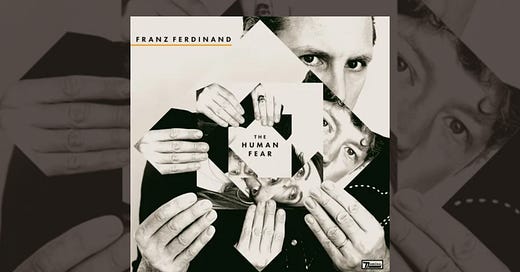Franz Ferdinand's sixth studio album, The Human Fear, released on January 17, 2025, has sparked discussions about its connection to the band's early sound. The album revisits the band's signature danceable beats and charismatic vocals, and while that means they’re mostly treading on familiar territory, the material is novel and fresh.
Lyrically, The Human Fear delves into themes of vulnerability, existential dread, and the complexity of human emotions, weaving these ideas through vibrant, anthemic tracks and introspective moments. The result is an album that balances the energy of their debut with the nuanced storytelling of a band two decades into their career.
History of the Archduke
Franz Ferdinand, formed in Glasgow, Scotland, in 2002, emerged as one of the defining bands of the post-punk revival movement of the early 2000s. The band was founded by Alex Kapranos (vocals, guitar), Bob Hardy (bass), Nick McCarthy (guitar, keyboard, vocals), and Paul Thomson (drums).
Their self-titled debut album, Franz Ferdinand (2004), catapulted them to international fame, powered by the breakout of the second single "Take Me Out." The album's blend of angular guitar riffs, catchy hooks, and danceable rhythms earned them critical acclaim, a Mercury Prize win, and commercial success.
They followed up with You Could Have It So Much Better (2005), which maintained their energetic style while experimenting with more diverse sounds. Subsequent albums like Tonight: Franz Ferdinand (2009) and Right Thoughts, Right Words, Right Action (2013) saw the band exploring electronic influences and maintaining their reputation for vibrant live performances.
In 2016, founding guitarist Nick McCarthy departed, and in 2017 the band added Dino Bardot and Julian Corrie to their lineup, rejuvenating their sound. This change was evident in their fifth studio album, Always Ascending (2018), which leaned into synth-pop elements. Founding drummer Paul Thomson left the band in 2021 with Audrey Trait taking over behind the kit since.
Franz Ferdinand has remained influential for their ability to blend indie rock with a pop sensibility, producing music that bridges the gap between art rock and mainstream appeal. Known for their sharp lyrics and dynamic stage presence, the band continues to evolve while staying true to their roots.
The Human Fear
Against the tapestry of sounds The Human Fear is releasing into, Franz Ferdinand’s retro-inspired vibe (though still charming) isn’t quite as radical to the ear as it was in 2004, and as Zach Schonfeld said in Pitchfork, the album “isn’t provocative enough to revitalize their reputation, but it certainly won’t do it any harm.” Initial reception to the Scottish band’s sixth studio album has been mostly positive.
Some critics note that tracks like "Night or Day" and "Audacious" have the same Britpop nostalgia and driving guitar riffs that helped them gain notoriety early on (Financial Times). Others appreciate the band's efforts to balance their classic sound with new creative explorations: two early songs on the album, “The Doctor” and “Hooked,” lean more on the group’s groovy, poppier influences than we’ve seen so far on a record, while in standout track “Black Eyelashes” you can hear a decidedly Greek influence on Kapranos’ guitar noodling. “Build It Up” and “Night Or Day” are about as vintage Franz Ferdinand as it gets with their infectious grooves, angular guitar riffs, and sharp vocal delivery that evoke the band's early hits.
A real star on the album is “Tell Me I Should Stay.” At 4:45, the longest track unfolds as a slow-burning, emotionally charged centerpiece. The song begins with a minimalist arrangement of subdued piano chords and a haunting bassline, gradually building layers of atmospheric synths and shimmering guitar riffs. Alex Kapranos delivers one of his most vulnerable vocal performances, navigating themes of longing, indecision, and the emotional weight of relationships.
The album’s production shines here, balancing the raw emotion of the lyrics with an expansive, almost ethereal soundscape. "Tell Me I Should Stay" stands out as a testament to Franz Ferdinand's ability to craft deeply resonant and artistically ambitious music while maintaining their signature style.
Capturing Fear On Tape
The Human Fear was recorded at AYR Studios in Scotland. The album was produced by Mark Ralph, a seasoned producer known for his work with bands like Hot Chip and Clean Bandit, and who had previously collaborated with Franz Ferdinand as a mixer and recording engineer on their 2013 album Right Thoughts, Right Words, Right Action. Ralph’s familiarity with the band’s sound and his expertise in blending organic and electronic elements no doubt helped shape the cohesive yet experimental production of The Human Fear.
The album's title, The Human Fear, reflects its overarching lyrical themes, which revolve around the concept of fear as a central aspect of the human experience. According to frontman Alex Kapranos, the lyrics delve into the universal and personal anxieties that define modern life, exploring how fear can both paralyze and motivate individuals. Kapranos described the record as a "search for the thrill of being human via fears," capturing the band's attempt to turn raw emotion into something cathartic and relatable. This thematic focus is reflected in tracks such as "Audacious," which tackles fear of failure and self-doubt, and "Night Or Day," which examines the tension between uncertainty and spontaneity (Domino).
Musically, the album combines the signature angular guitars and driving bass lines that define Franz Ferdinand’s early work with a fresh emphasis on atmospheric textures and rhythmic experimentation, echoing the album's emotional complexity.






Great review 👍